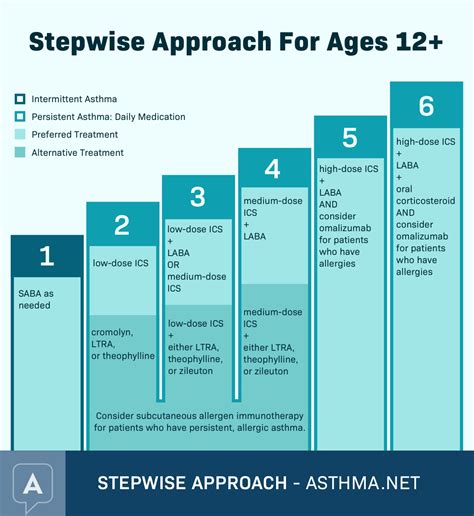Effective Asthma Management Techniques
Asthma Management FAQ
How do you treat a severe asthma?
Inhalers, which are devices that let you breathe in medicine, are the main treatment. Tablets and other treatments may also be needed if your asthma is severe. You'll usually create a personal action plan with a doctor or asthma nurse.
What does who do about asthma?
WHO is committed to improving the diagnosis, treatment and monitoring of asthma to reduce the global burden of NCDs and make progress towards universal health coverage. Asthma is a chronic lung disease affecting people of all ages. It is caused by inflammation and muscle tightening around the airways, which makes it harder to breathe.
Is there a cure for asthma?
There's currently no cure for asthma, but treatment can help control the symptoms so you're able to live a normal, active life. Inhalers, which are devices that let you breathe in medicine, are the main treatment. Tablets and other treatments may also be needed if your asthma is severe.
Can asthma be managed?
While asthma can be debilitating, it is possible to manage with the help of professionals. Recognising your triggers and committing to following a treatment plan can help improve your chances of a happy life with asthma. Is it possible to reduce asthma over time?
What is good asthma management?
Good asthma management includes strategies to avoid and/or manage known triggers of exacerbations. Also to identify and manage patients’ over-reliance on reliever treatments and where patients are suspected to have severe asthma ensuring referral for rapid assessment and treatment.
What does the asthma guideline cover?
The guideline covers diagnosis and management of asthma in adults and children and sections of the guideline are updated biennially.
What are the three scenarios of asthma management?
Scenario: Newly-diagnosed asthma: Covers the management of children and adults with newly diagnosed or suspected asthma. Scenario: Follow-up: Covers the appropriate follow-up of children and adults who have asthma. Scenario: Acute exacerbation of asthma: Covers the management of an acute exacerbation of asthma.
How is asthma treated?
Asthma is usually treated by using an inhaler, a small device that lets you breathe in medicines. reliever inhalers – used when needed to quickly relieve asthma symptoms for a short time preventer inhalers – used every day to prevent asthma symptoms happening Some people also need to take tablets.
Asthma Management References
If you want to know more about Asthma Management, consider exploring links below:
What Is Asthma Management
- https://www.asthmaandlung.org.uk/conditions/asthma/managing-asthma-adults
- https://cks.nice.org.uk/topics/asthma/management/
- https://www.nhs.uk/conditions/asthma/treatment/
- https://www.who.int/news-room/fact-sheets/detail/asthma
- https://www.nice.org.uk/guidance/ng80
- https://www.mayoclinic.org/diseases-conditions/asthma/diagnosis-treatment/drc-20369660
- https://patient.info/news-and-features/how-is-asthma-managed-and-treated
Asthma Management Information
Explore Related Topics
Monitoring Asthma: Apps and Tools for Recognizing Attack Signs
Discuss the latest apps and tools available for monitoring asthma symptoms and recognizing early attack signs.
The Power of Peppermint Oil in Asthma Management: Fact or Fiction?
Investigating peppermint oil's supposed benefits for asthma management. Can this essential oil truly make breathing easier, or is it merely anecdotal? Let's dissect facts from fiction.
Patient Feedback on Digital Asthma Management Tools: What We Can Learn
Discuss the importance of patient feedback on digital asthma management tools and how it shapes future developments.
The Cost-Effectiveness of VR Asthma Management Tools
Discussing the financial aspects and cost-effectiveness of incorporating VR tools into asthma treatment plans.
What's the Latest in Gamification for Pediatric Asthma Patients?
Sharing and discussing the latest gamification technologies and platforms designed for children with asthma.
The Impact of Global Pandemics on Flu Vaccination for Asthmatics
Delve into how global health crises have influenced flu vaccination strategies for people with asthma.
What are the best asthma management apps for kids?
Reviewing digital tools and apps designed to help manage children's asthma. This thread aims to share and discuss the most effective asthma management apps for children from both a parental and medical point of view.
Non-Medical Items You Didn’t Know You Needed in Your Asthma Kit
Share and discover non-medical items that can be surprisingly useful to include in an asthma emergency kit.
Personalized Medicine in Asthma: The Role of Mobile Apps
Discussing how mobile apps are supporting personalized medicine in asthma management through tracking and analysis features.
Privacy Concerns with Asthma Health Apps: How Safe Are You?
Engage in a discussion on the privacy concerns surrounding health apps for asthma and measures to ensure your data is secure.
What's the latest in asthma research for kids?
Keeping up with recent advancements in asthma treatment options for children. A thread for sharing and discussing the latest research findings and treatments for managing childhood asthma.
Integrating Health Apps into Daily Asthma Care: Practical Tips
Share and discover practical tips for seamlessly integrating health apps into daily asthma management routines.
Which Exercise Apps Truly Understand Asthma Needs?
Let's talk about which exercise apps cater well to asthmatics and why. Your recommendations and warnings are welcome.
What's the Best Gamified App for Asthma Management in Children?
Seeking recommendations and experiences with apps that use gamification to help children manage their asthma.
Are There Safe Exercises for Asthma Patients?
Identifying which forms of exercise are safer and more beneficial for individuals with asthma, aiming to encourage physical activity without triggering symptoms.
Can Smart Inhalers Reduce Asthma Attack Frequency?
Exploring the potential of smart inhalers in preventing asthma attacks and reducing their frequency.
Can Digital Health Tools Predict Asthma Attacks?
Discussing the potential of digital health tools and predictive analytics in foreseeing asthma exacerbations, enhancing personalized medicine approaches.
Can Smart Inhalers Transform Asthma Care?
Discussing the benefits and limitations of smart inhalers in monitoring and managing asthma symptoms.
Has Anyone Tried the Latest Asthma Tracking Apps?
Delve into the world of asthma tracking apps. Share your experiences, the pros and cons, and how they've influenced your exercise routines.
